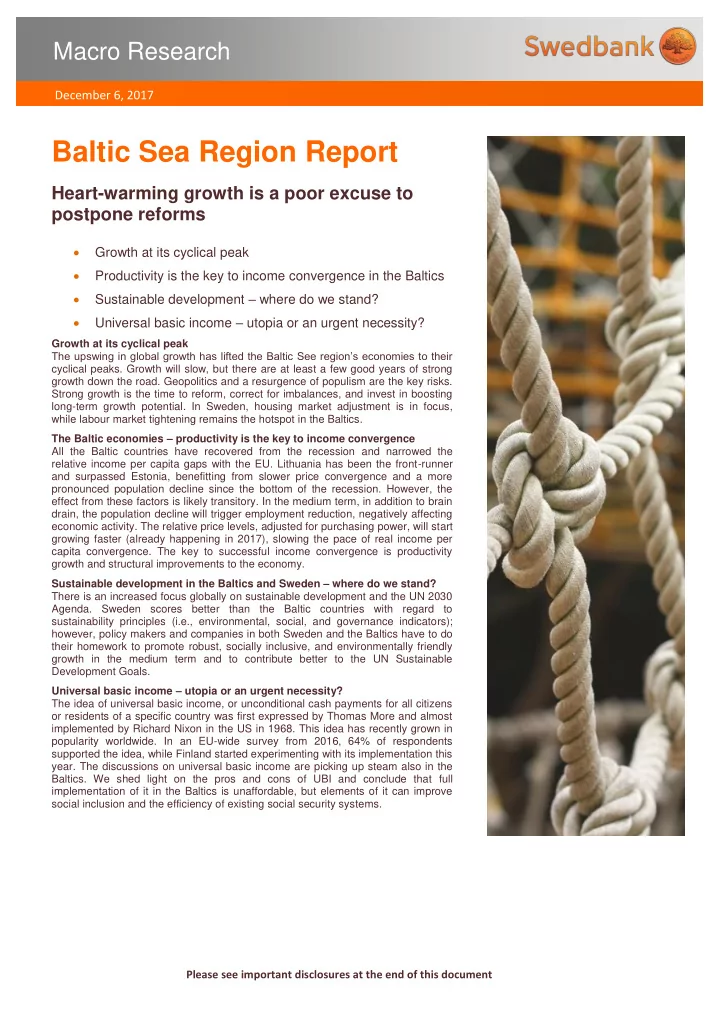

Macro Research Macro Research - Baltic Sea Region Report December 6, 2017 Baltic Sea Region Report Heart-warming growth is a poor excuse to postpone reforms Growth at its cyclical peak Productivity is the key to income convergence in the Baltics Sustainable development – where do we stand? Universal basic income – utopia or an urgent necessity? Growth at its cyclical peak The upswing in global growth has lifted the Baltic See region’s economies to their cyclical peaks. Growth will slow, but there are at least a few good years of strong growth down the road. Geopolitics and a resurgence of populism are the key risks. Strong growth is the time to reform, correct for imbalances, and invest in boosting long-term growth potential. In Sweden, housing market adjustment is in focus, while labour market tightening remains the hotspot in the Baltics. The Baltic economies – productivity is the key to income convergence All the Baltic countries have recovered from the recession and narrowed the relative income per capita gaps with the EU. Lithuania has been the front-runner and surpassed Estonia, benefitting from slower price convergence and a more pronounced population decline since the bottom of the recession. However, the effect from these factors is likely transitory. In the medium term, in addition to brain drain, the population decline will trigger employment reduction, negatively affecting economic activity. The relative price levels, adjusted for purchasing power, will start growing faster (already happening in 2017), slowing the pace of real income per capita convergence. The key to successful income convergence is productivity growth and structural improvements to the economy. Sustainable development in the Baltics and Sweden – where do we stand? There is an increased focus globally on sustainable development and the UN 2030 Agenda. Sweden scores better than the Baltic countries with regard to sustainability principles (i.e., environmental, social, and governance indicators); however, policy makers and companies in both Sweden and the Baltics have to do their homework to promote robust, socially inclusive, and environmentally friendly growth in the medium term and to contribute better to the UN Sustainable Development Goals. Universal basic income – utopia or an urgent necessity? The idea of universal basic income, or unconditional cash payments for all citizens or residents of a specific country was first expressed by Thomas More and almost implemented by Richard Nixon in the US in 1968. This idea has recently grown in popularity worldwide. In an EU-wide survey from 2016, 64% of respondents supported the idea, while Finland started experimenting with its implementation this year. The discussions on universal basic income are picking up steam also in the Baltics. We shed light on the pros and cons of UBI and conclude that full implementation of it in the Baltics is unaffordable, but elements of it can improve social inclusion and the efficiency of existing social security systems. Please see important disclosures at the end of this document December 6, 2017 Please see important disclosures at the end of this document Page 1 of 31
Macro Research - Baltic Sea Region Report The Baltic Sea region and Swedbank Baltic Sea index 2017 The aim of the Baltic Sea Report is to assess the structural quality and strength of the Baltic Sea region economies from the point of the legal and business environment, and to provide analysis and suggest possible interventions by policymakers to support the swift and sustainable growth of their economies. The region includes 10 countries around the Baltic Sea: Germany, Denmark, Norway, Sweden, Finland, Russia, Estonia, Latvia, Lithuania, and Poland. Detailed analysis is provided for Swedbank’s four home markets: Sweden, Estonia, Latvia, and Lithuania. Contents Introduction: Growth at its cyclical peak .................................................................... 3 Sweden: Strong growth but lack of structural reforms ............................................... 7 Estonia: Good times to be used wisely .................................................................... 9 Latvia: Use growth to pay for reforms! .................................................................... 11 Lithuania: Fading potential growth ......................................................................... 13 The Baltic economies: Productivity is the key to further income convergence ......... 15 Sustainable development in the Baltics and Sweden: Where do we stand? ...... 18 UBI: Utopia or an urgent necessity?.................................................................... 23 Appendix: Swedbank Baltic Sea Index................................................................ 27 December 6, 2017 Please see important disclosures at the end of this document Page 2 of 31
Recommend
More recommend